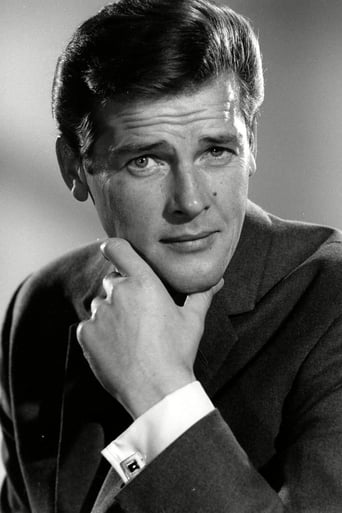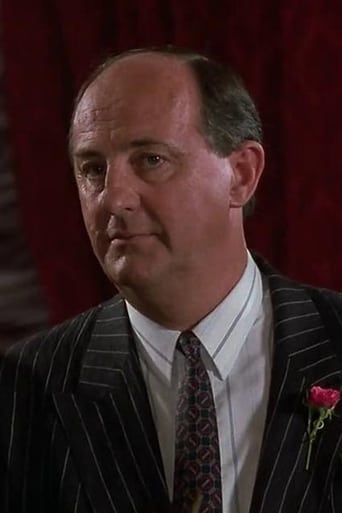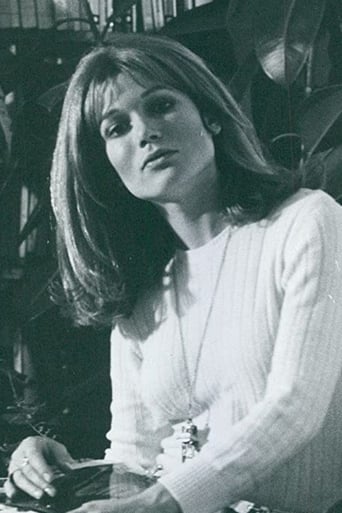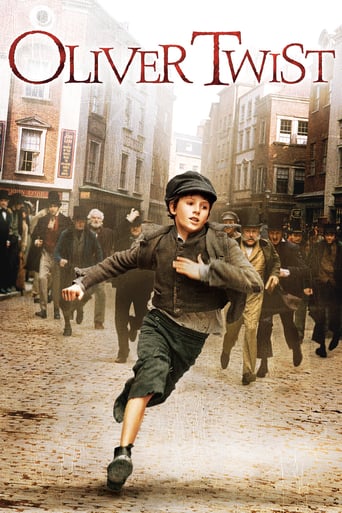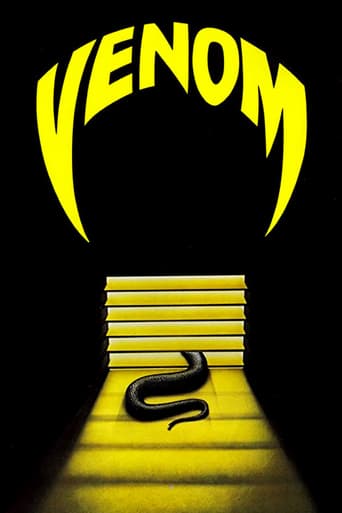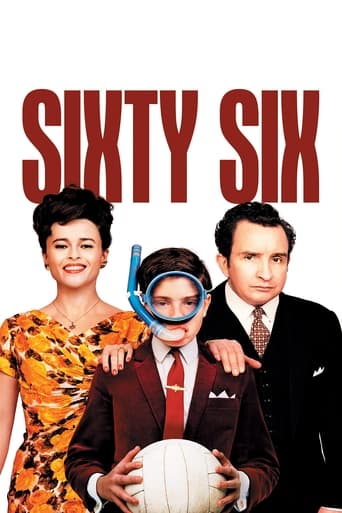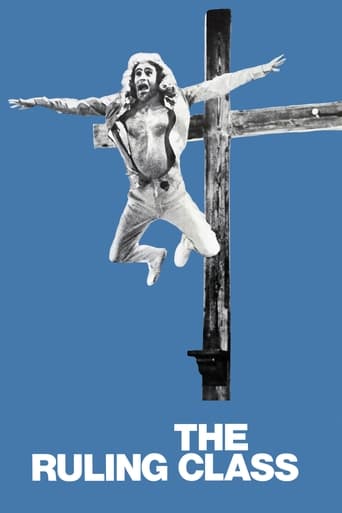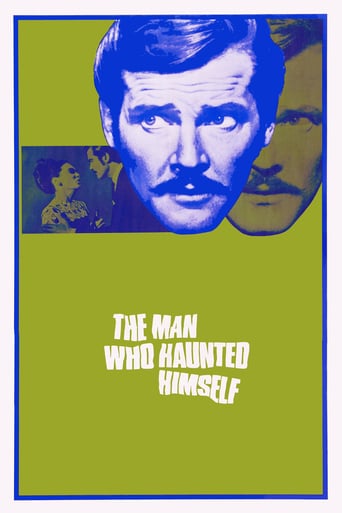
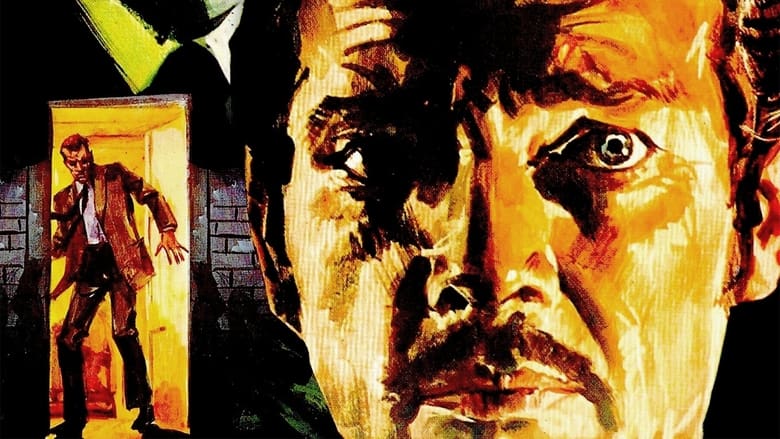
The Man Who Haunted Himself (1970)
Executive Harold Pelham suffers a serious accident after which he faces the shadow of death. When, against all odds, he miraculously recovers, he discovers that his life does not belong to him anymore.
Watch Trailer
Cast


Similar titles
Reviews
Tells a fascinating and unsettling true story, and does so well, without pretending to have all the answers.
This is one of the few movies I've ever seen where the whole audience broke into spontaneous, loud applause a third of the way in.
This is a coming of age storyline that you've seen in one form or another for decades. It takes a truly unique voice to make yet another one worth watching.
The film's masterful storytelling did its job. The message was clear. No need to overdo.
The Man Who Haunted Himself, despite having a quality premise and a solid lead performance from Moore, falls short of being memorable.The resolution is probably its biggest downfall. They talk it out and then he runs off the road, dies and disappears. Yes it resolved the situation, his life goes on, but what does it do for the viewer? Plus Pelham having those repetitive flashes while driving at the end, was really annoying. Why didn't he enjoy spending time with and want to be intimate with his wife? That was odd. It was also rather sluggish at times. I did like it, it just could of been so much more.
With its 1970s chic cheese and swagger and Roger Moore's excellent performance, The Man Who Haunted Himself has a considerable cult fan base. Directed by British legend Basil Dearden, plot finds Moore as Harold Pelham, who after being involved in a serious car accident, comes around from the trauma to find that his life is being turned upside down. It seems that somebody is impersonating him, people he knows swear he was in places he hasn't been, that he has been making decisions at work that he knows nothing about, and that he has a sexy mistress that threatens to destroy his marriage. Is he going mad? A victim of a collective practical joke? Or is there really something more sinister going on?Don't be a slave to convention!So yeah! A cult gem waiting to be rediscovered is The Man Who Haunted Himself, it has a plot that positively bristles with intrigue. As the doppleganger motif is tightly wound by Dearden, who smartly sticks to understated scene constructions as opposed to supernatural excess, there's a realistic and human feel to the story. The makers are not going for jolt shocks, but taking a considered approach that has the pertinent mystery elements lurking in the background, waiting for their chance to reveal themselves for the utterly thrilling finale. A finale that is bold and special, obvious but not, and definitely tinged with cunning ambiguity.With Moore drawing on talent from his acting pool that many thought he didn't have (two different characterisations smartly realised here), and Dearden pulling the technical strings (love those off-kilter angles and multi mirrored images), this is a film that has surprises in store all across the board. 8/10
Despite I was a child when I watched it, I didn't manage to be scared. And I tried.The opening sequence says all. There's this proper gentleman driving his dignified car along the highway, the sun shines in the sky and everything is jolly good when all of a sudden for no apparent reason he pulls out a kind of "evil" face, pushes the throttle down and starts driving like a madman.Then he has an accident, obviously. A bit strange accident, truth be told. We see him squeezing his tyres from side to side for something like five minutes without hitting any other car and finally pulling down some cones and a wooden fence. This must be a serious accident in England though, because next thing he's struggling for his life in the emergency room.Which is notable since his body shows no injuries and there isn't the smallest trace of blood round there. But this is only the beginning. During the surgery (don't ask me what kind of surgery, there were doctors doing stuff and yelling to each other) his heartbeat literally splits in two and becomes "double". I'm not kidding you. There are two different lines doing beep beep now on the monitor of the machinery whereas there was only one moments before. And nobody there seem to notice that.Now, you would expect these unusual events being explained along the movie. I don't know, the devil, reincarnation, something.No way.You are only allowed to know that now there's a second Mr. Pelham in town, dating girls and driving sports cars dressed like a buffoon (Where does he sleep? Where does he get his money? Does he have a driving license to show to the police in case they stop him?).We can understand this movie only if we consider it not a horror but a goofy social satire on middle-class dullness. An "American beauty" ante litteram. And even so...I loved the very English background and the seventies atmosphere.Not actually a movie, rather a good laugh.
Roger Moore rates his performance in The Man Who Haunted Himself as the best of his career. It makes for a rather interesting insight when actors or directors or composers reveal what they consider their finest work. While the film itself in this case may not be the best that the actor has ever appeared in, Moore is probably right about his performance in it. He gets to register hitherto unseen emotions and nuances as the title character, and the script demands more "genuine" acting than he ever had to produce in the days of The Saint, The Persuaders, James Bond, or indeed any of his other movies.A dull and conservative business man named Harold Pelham (Roger Moore) is driving home from work one day when he does something extremely uncharacteristic. Almost as if possessed, he removes his seatbelt and drives terrifyingly fast, ultimately crashing his car. Later, while the unconscious Pelham is on an operating table his heart temporarily stops and it is only thanks to the speedy reactions of the doctors that he is revived. For a moment after his revival, something very strange happens TWO heartbeats are briefly detected on the heart monitor. The operating doctors simply assume that their equipment is faulty. A while later, the fully healed Pelham returns to his usual routines family life, work, social life, etc. But soon weird events start to plague him people claim to have spoken to him the week before even though he has been on holiday; people turn up for lunch at his house when he swears he hasn't invited them; one man even pays up for losing a snooker match against him at the club, when in actual fact Pelham has no memory of playing the game. At work, a business opportunity involving a new electronic device is beset with problems as an alleged "mole" leaks details of the product to a rival company. Pelham begins to suspect that an impostor is trying to sabotage his life. Gradually, the awful truth becomes clear. When he died on the operating table and had to be resuscitated, a doppelganger (or "alter ego") was released . and now the real Pelham and his sinister double are locked in a life-and-death struggle against each other.The Man Who Haunted Himself is an intriguing "thinking-man's" bloodcurdler. The story (by Anthony Armstrong) had already seen light as a 30-minute short on Alfred Hitchcock Presents. This extended version fleshes things out a bit more, and spends more time philosophising about the definition of identity, with Moore giving a riveting turn both as the bewildered hero and his evil double. In some ways the extra details inadvertently weaken the story, distracting audience attention from the teasing plot by dragging in too many characters and subplots. But it is worth persevering with the film through its periodic lulls, especially so that one can enjoy the absolutely terrific final scene a thrilling car chase in which the real Pelham and the doppelganger pursue each until one of them plunges to his death over the side of a bridge. The ending is wonderfully unsettling and thought-provoking. On the whole, The Man Who Haunted Himself is a worthwhile audience teaser, a little drawn-out and heavy-handed in parts, but generally an enjoyable excursion into the supernatural for those who like such things.


